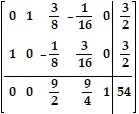Solve the quadratic equation by completing the square.
?

?
A. -6, -3
B. 6, 3
C. -6, 3
D. ?6, 3
E. 18, -3
Answer: C
You might also like to view...
Use the compound interest formula to determine the final value of the given amount.$480 at 6% compounded quarterly for 7 years
A. $721.74 B. $248.27 C. $717.50 D. $728.27
The current in an alternating circuit varies in intensity with time. If I represents the intensity of the current and t represents time, then the relationship between I and t is given by ? I = 20cos 160?t ? where I is measured in amperes and t is measured in seconds. Find the maximum value of I and the time it takes for I to go through one complete cycle. ?
A. The maximum value of I is 40 amperes; one complete cycle takes 
B. The maximum value of I is 5 amperes; one complete cycle takes 
C. The maximum value of I is 20 amperes; one complete cycle takes 
D. The maximum value of I is 40 amperes; one complete cycle takes 
E. The maximum value of I is 20 amperes; one complete cycle takes 
Solve the equation. Write complex solutions in standard form.5x2 + 4 = x
A.  ± i
± i
B. -  ,
, 
C.  ± i
± i
D. 1 ± 
A furniture manufacturer makes TV tables and bookcases in the same workshop. Each item brings in a profit of $18. Each bookcase requires 2 hours of labor 3 units of teak wood. Each TV table requires 6 hours of labor and 1 unit of teak wood. Resources in the workshop are restricted to 6 units of teak wood a day and 12 hours of labor per day. The initial and final tableau are given below with x = the number of TV tables and y = the number of bookcases produced each day.?
 ?
?
/>(initial)(final)Write the dual problem to the above primal problem and give a short interpretation of the dual and its solution. What will be an ideal response?